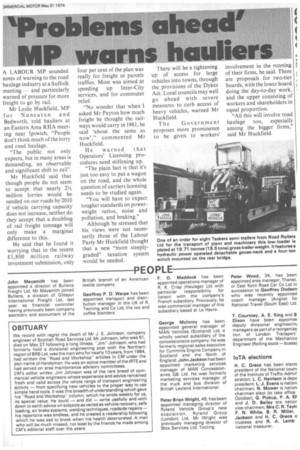'Problems ahead' MP warns hicualliers
Page 17

If you've noticed an error in this article please click here to report it so we can fix it.
A LABOUR MP sounded notes of warning to the road haulage industry at a Suffolk meeting — and particularly warned of pressure for more freight to go by rail.
Mr Leslie Huckfield, MP for Nuneaton and Bedworth, told hauliers at an Eastern Area R HA meeting near Ipswich, "People don't think much of the lorry and road haulage.
"The public not only expects, but in many areas is demanding, an observable and significant shift to rail".
Mr Huck field said that though people do not seem to accept that nearly 21/2 million lorries would be needed on our roads by 2010 if vehicle carrying capacity does not increase, neither do they accept that a doubling of rail freight tonnage will only make a marginal difference to this.
He said that he found it worrying that in the recent £1,800 million railway investment submission, only four per cent of the plan was really for freight or parcels traffics. Most was aimed at speeding up Inter-City services, and for commuter relief.
"No wonder that when I asked Mr Peyton how much freight he thought the railways would carry in 1981, he said 'about the same as now'," commented Mr Huckfield.
He warned that Operators' Licensing procedures need stiffening up.
"The plain fact is that it's just too easy to put a wagon on the road, and the whole question of carriers licensing needs to be studied again.
"You will have to expect tougher standards on powerweight ratios, noise and pollution, and braking."
Although he stressed that his views were not necessarily those of the Labour Party Mr Huckfield thought that a new "more steeplygraded" taxation system would be needed. "1 here will be a tightening up of access for large vehicles into towns, through the provisions of the Dykes Act. Local councils may well go ahead with severe measures to curb access of heavy vehicles, warned Mr Huckfield.
The Government proposes more prominence to be given to workers' involvement in the running of their firms, he said. There are proposals for two-tier boards, with the lower board doing the day-to-day work, and the upper consisting of workers and shareholders in equal proportion.
"All this will involve road haulage too, especially among the bigger firms," said Mr Huckfield.




























































































